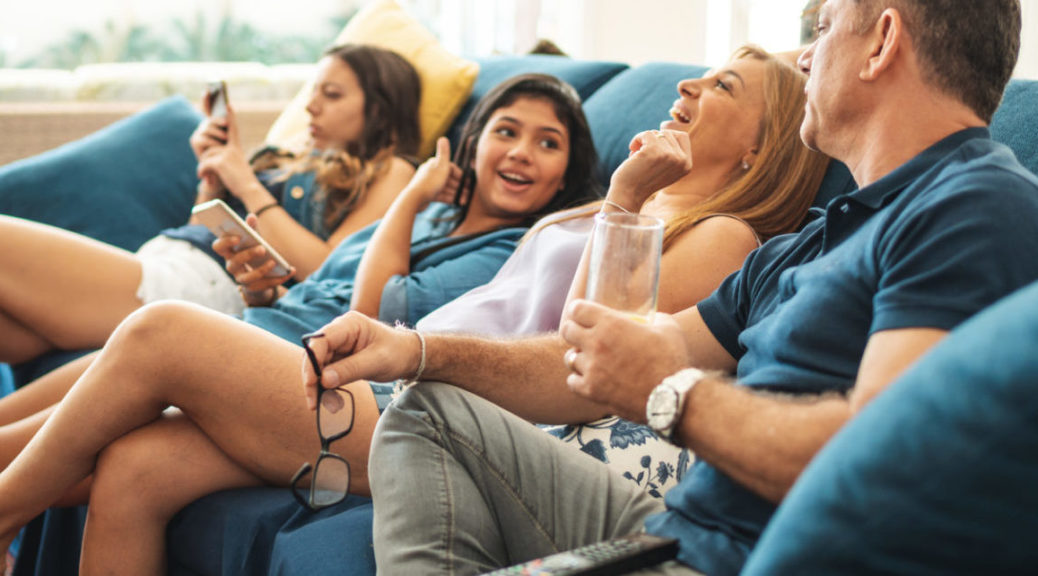Media Exposure and Mental Health: Coping During COVID-19

An ever-changing pandemic combined with a 24/7 news cycle and limited ability to leave the house have led to increased screen time for many of us. We need accurate, current information to keep our families safe. But it’s often easy to consume too much media. It can take a toll on you if you’re bingeing and scrolling to fill your days. When much of the news isn’t good news, it can be detrimental to you and your children. What is the best way to balance media and mental health?
Do you believe every child deserves to be safe and connected to a strong family? Join us to receive a few inspiring stories each month and help end childhood adversity. Subscribe here!
As part of our Coping During COVID-19 series, KVC’s Chief Clinical Officer, Chad E. Anderson shares tips to help you and your family manage media during this health crisis.
Media and Mental Health for Adults
Studies show that repeated media exposure to community crisis can increase anxiety and stress, which can have longer-term negative effects on your health. Here are several ways to protect yourself:
- Find the facts. Some media exposure is needed to help us make informed decisions. Details like understanding the current stay at home guidelines for your city, or knowing the new deadline for tax filing are very important. Get the information you need from one or two trusted sources, such as the U.S. Centers for Disease Control and Prevention, and then move on.
- Set boundaries. Be aware of the amount and quality of information you expose yourself to. When you find yourself mindlessly scrolling or going down an unproductive or anxiety-producing rabbit hole, stop. Turn off breaking news alerts on your phone. Institute a “no devices at the dinner table” rule and limit them during family activities as well.
- Maintain perspective. If you feel overwhelmed or anxious, keep in mind that the majority of people who contract COVID-19 experience mild symptoms, and that the majority also recover from it. The APA offers helpful guidance on how to handle the deluge of COVID-19 coverage here.
- Rethink your bedtime routine. If you currently get into bed and then watch the news or read it on your phone, opt for something else instead. Read a book, write in a gratitude journal or find another way to help your mind unwind before you try to sleep.
- Model responsible consumption. Leading by example is the best way to teach your family how to safely and responsibly handle media during this crisis. Pay attention to how you react and respond to news reports. If you remain calm and rational, your children will too.
Media and Mental Health for Kids
The US Department of Health and Human Services estimates that American children spend up to seven hours a day in front of electronic media. Twenty five percent of teens describe themselves as “constantly connected” to the internet. Excessive screen time for children and teens can lead to obesity, depression, anxiety and other issues. Here are steps you can take to help your kids find an appropriate balance:
- Communicate. It’s important to have honest and age-appropriate conversations about this health crisis with your children. Keep your tone calm and comforting. Have an open and on-going dialogue as circumstances continue to change. This helpful article provides tips for how to talk to your children about COVID-19. If you have small children, here are some great tips from Sesame Street in Communities for engaging with them.
- Set and enforce time limits. Physical activity is critical for your children’s physical and mental development. Time spent in front of the television is time that children are not being active. Be sure to balance screen time with plenty of physical activities that they enjoy. There are many psychological benefits to exercise. Movement can help to improve your mood and relax you. Research also shows that exposure to nature can help reduce stress and anxiety, so take these activities outside whenever you can.
- Set up parental controls on devices. Although older children are better able to understand current events, they may still have trouble separating fact from fiction. Monitor their usage. Steer them toward reputable sources and restrict any that you deem unsafe. Protect your teens with these helpful tips. For younger children who may be feeling anxious, make sure browsers open to a neutral or kid-friendly URL instead of the latest headlines.
- Keep them connected with their community. In this time of physical separation, your kids may feel isolated. Allowing time for texting and video chatting can provide a sense of normalcy and offer an outlet to share feelings with others their age.
- Ensure screen-free sleep. End screen time at least an hour before bedtime. If youth have televisions in their bedrooms, include them in this rule. Charge devices overnight in a common area outside of bedrooms to ensure sleep is uninterrupted by alerts, and that devices aren’t being used once children are tucked into bed.
The experts at KVC are here for you during this health crisis. There are many more helpful tips and resources in our Coping During COVID-19 series. You can also follow us on Facebook or Instagram for more updates and information.





